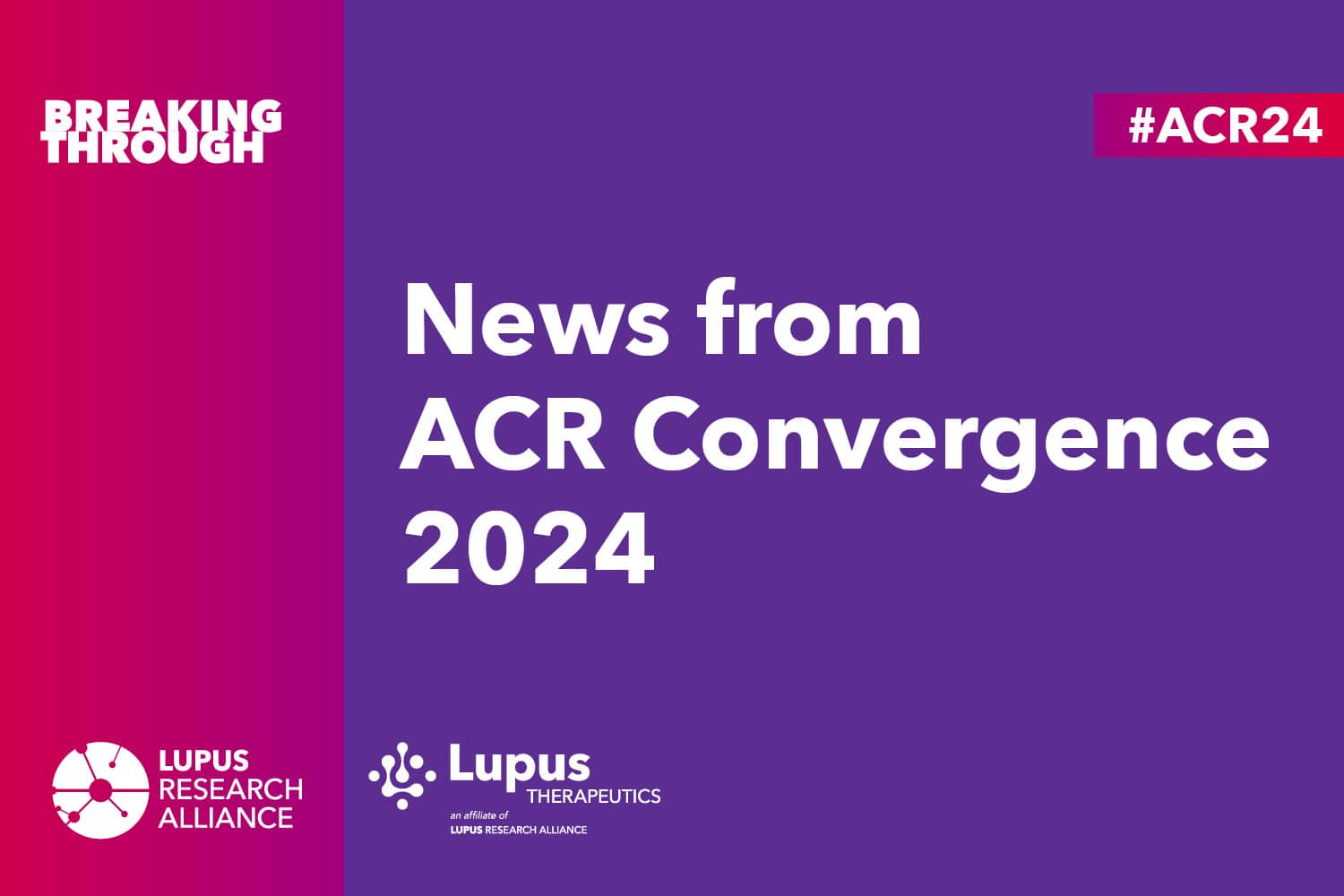Lupus Research Alliance Announces Lupus Research Highlights at ACR Convergence 2024

Lupus Research Alliance Announces Lupus Research Highlights at ACR Convergence 2024
Highlights:
- Sixteen presentations of preclinical studies funded by the Lupus Research Alliance to advance understanding of lupus and potential treatment pathways, including four oral presentations
- Two reports by Lupus Therapeutics, the clinical affiliate of the LRA, and the Lupus Clinical Investigators Network (LuCIN), on promoting equity in lupus clinical trials, and identifying trial barriers and solutions
- Panel presentation by Saira Shiekh, MD, Vice Chair of LuCIN, on increasing diversity in Systemic Lupus Erythematosus (SLE) trials, with data from the Patient Advocates for Lupus Studies (PALS) program, a peer-to-peer clinical trial education initiative co-designed with people with lupus
- Fifteen industry-sponsored clinical research studies supported by Lupus Therapeutics and LuCIN, including positive results from the late-breaking Phase 3 dapirolizumab pegol trial
The Lupus Research Alliance (LRA), the largest private funder of lupus research worldwide, today announced that 34 presentations, including research funded by the organization or supported by its clinical research affiliate Lupus Therapeutics, will be part of ACR Convergence 2024. The annual meeting of the American College of Rheumatology takes place November 14-19, at the Walter E. Washington Convention Center in Washington, D.C.
The LRA, which seeks to accelerate the discovery and development of patient-centered treatments and diagnostics, pursues strategies to spur advancements from “bench to bedside.” LRA-supported studies presented at ACR Convergence 2024 represent the full continuum of lupus research, from foundational research exploring new avenues of knowledge, to clinical trials evaluating potential new treatments.
“ACR Convergence 2024 is met with pride and excitement by the Lupus Research Alliance and Lupus Therapeutics – pride in seeing the fruits of our funding and other initiatives to accelerate drug discovery and development, and excitement as we stand on the precipice of some important advancements,” said LRA President and CEO Albert T. Roy.
“There are more trials in mid-to-late-stage development than ever before, including dapirolizumab pegol in Phase 3 from UCB/Biogen, a Lupus Therapeutics partner. And we are gratified to witness the volume of CAR T cell therapy approaches in clinical development, having invested in 2014 in early research suggesting this approach as a promising intervention to explore for treating lupus,” Roy added.
Foundational Research Funded by the LRA
Sixteen studies of LRA-funded research (four oral presentations and 12 posters) will be presented. Several focus on Childhood-Onset Systemic Lupus Erythematosus (cSLE), including: a detailed characterization of the disease; the effects of fatigue on pediatric patients’ mental and physical health; and the discovery of Anti-Mitochondrial Antibodies (AMA), which are linked to higher disease activity.
Other studies include: the development of a precision immunotherapy to target harmful B cells in Antiphospholipid Syndrome (APS) patients; the discovery of innate signaling pathways crucial in causing inflammation in lupus patients; and the epidemiology of strokes in children and adults with lupus.
ORAL PRESENTATIONS
Saturday, Nov. 16
3:00-3:15 PM, Room 103AB
Sunday, Nov. 17
3:15-3:30 PM, Room 103AB
Monday, Nov. 18
Xist and XChromosome Inactivation in Female Biased Autoimmunity
9:00-9:30 AM, Room 145AB
3:30-3:45 PM, Room 202AB
POSTERS
Saturday, Nov. 16
Poster Session A, 10:30 AM-12:30 PM, Poster Hall:
Sunday, Nov. 17
Poster Session B, 10:30 AM-12:30 PM, Poster Hall:
Abstract #1273: An Investigation of Traumatic Events and Mental Health in cSLE
Monday, Nov. 18
Poster Session C, 10:30 AM-12:30 PM, Poster Hall:
Abstract #1788: Memory B Cell Activation and Dysregulation in Systemic Lupus Erythematosus
Research Conducted by Lupus Therapeutics and the Lupus Clinical Investigators Network (LuCIN)
Lupus Therapeutics, the clinical affiliate of the Lupus Research Alliance, oversees the Lupus Clinical Investigators Network (LuCIN), consisting of 50+ premier, leading medical research institutions in North America, comprised of 200+ providers with expertise in lupus care and clinical trials. Two posters based on annual surveys of LuCIN investigators and research teams focus on promoting equity in lupus clinical trials and identifying trial barriers and solutions.
In addition, a panel discussion on improving clinical trial design and analysis in relation to increasing diversity in SLE trials will include data from the Patient Advocates for Lupus Studies (PALS) program. PALS is a peer-to-peer clinical trial education initiative, co-designed with people with lupus, which aims to improve participation in lupus clinical trials.
POSTERS
Saturday, Nov. 16
Poster Session A, 10:30 AM-12:30 PM, Poster Hall
Sunday, Nov. 17
Poster Session B, 10:30 AM-12:30 PM, Poster Hall
SCIENTIFIC SESSION
Monday, Nov. 18
18M25: Meet the Panel: How Can We Rescue Clinical Trials?
10:30-11:30 AM, Room 145AB
Including: Lessons from the PALS Program on Increasing Diversity in SLE Trials
Saira Sheikh, MD, LuCIN Vice Chair, Linda Coley Sewell Distinguished Professor of Medicine, University of North Carolina at Chapel Hill
Clinical Research Supported by Lupus Therapeutics and LuCIN
The primary goal of Lupus Therapeutics and LuCIN is to accelerate and enhance the quality of lupus clinical trials through clinical expertise, advisory services, patient engagement and partnership/collaboration with biopharmaceutical companies and research partners. Lupus Therapeutics and LuCIN are involved in nearly 25% of active lupus clinical trials. Fifteen Lupus Therapeutics/LuCIN-supported programs and collaborations are being presented at ACR Convergence 2024:
ORAL PRESENTATIONS
Sunday, Nov. 17
3:30-3:45 PM, Room 145AB
Monday, Nov. 18
1:30-1:45 PM, Room 146AB
2:15-2:30 PM Room 146AB
Tuesday, Nov. 19
***LATE-BREAKING ABSTRACT***
8:00-9:30 AM, 146AB
POSTERS
Saturday, Nov. 16
Poster Session A, 10:30 AM-12:30 PM, Poster Hall:
Sunday, Nov. 17
Poster Session B, 10:30 AM-12:30 PM, Poster Hall:
Monday, Nov. 18
Poster Session C, 10:30 AM-12:30 PM, Poster Hall:
About Lupus
Lupus is a chronic, complex autoimmune disease that affects millions of people worldwide. In lupus, the immune system, meant to defend against infections, produces autoantibodies that mistake the body’s own cells as foreign, causing other immune cells to attack organs such as the kidneys, brain, heart, lungs and skin, as well as blood and joints. Ninety percent of people with lupus are women, most often diagnosed between the ages of 15-45. Black, Latinx, Indigenous, Asian and Pacific Islander people are disproportionately affected by lupus and more likely to experience severe lupus symptoms.
About the Lupus Research Alliance
The Lupus Research Alliance is the largest non-governmental, non-profit funder of lupus research worldwide. The organization aims to transform treatment by funding the most innovative lupus research, fostering diverse scientific talent, and driving discovery toward better diagnostics, improved treatments and ultimately a cure for lupus. Because the Lupus Research Alliance’s Board of Directors funds all administrative and fundraising costs, 100% of all donations goes to support lupus research programs. For more information, please visit the LRA at LupusResearch.org and on social media at: X, Facebook, LinkedIn, and Instagram.
About Lupus Therapeutics
Lupus Therapeutics, the clinical research affiliate of the Lupus Research Alliance, aims to accelerate the development of curative treatments for all patients living with lupus. Lupus Therapeutics collaborates with premier research institutions, biopharmaceutical partners, and those living with lupus through the unprecedented Lupus Clinical Investigators Network (LuCIN) to drive rapid and meaningful progress in treatment development. The organization elevates the patient voice, engages community stakeholders, and strives for representation of the diverse lupus community in the clinical research process with the most innovative and renowned experts throughout North America. Visit LupusTherapeutics.org for more information.
# # #
Media Contacts: Margy Meislin, Lupus Research Alliance MMeislin@lupusresearch.org
Caren Begun, TellMed Strategies Caren.Begun@tmstrat.com



